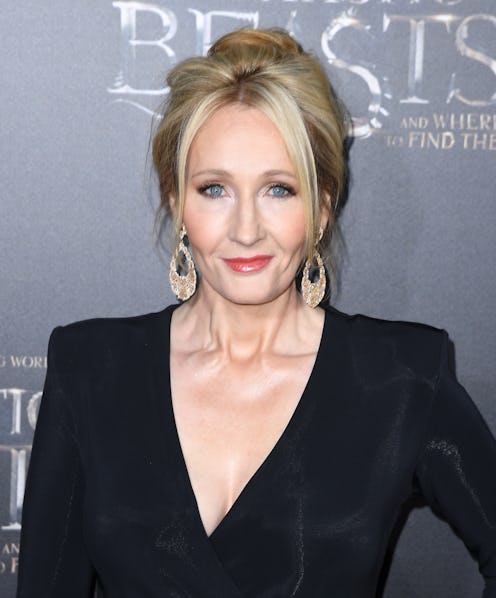
Rejoice, book nerds and Potterheads, because something good has come out of 2016! J.K. Rowling has a new website, and her first post contains plenty of answers to all your burning Fantastic Beasts questions.
Once upon a time, before Twitter was ~a thing~, J.K. Rowling's website was her "cosy corner of cyberspace," where she could interact with her audience on a fairly personal level. After Harry Potter and the Deathly Hallows was finished, however, Rowling — understandably — needed some quiet, and so her website lapsed into disuse. Several years ago, an attempt to revive her website failed, because, Rowling says, "I didn’t feel the same connection to the new design and it showed, because I hardly ever wrote anything for it." Now J.K. Rowling is back online with a new, redesigned website, which she says will function as "a faithful representation of [her] writing desk," minus the snack crumbs.
2016 has been the most intense year for Harry Potter fans since the film franchise wound up with Harry Potter and the Deathly Hallows — Part 2 in 2011. Rowling says she didn't expect for this crapshoot of a year to be "one of the busiest professional years of [her] life," and admits that she feels the call of the magical world just as strongly as we do:
I didn’t plan for the stage play Harry Potter and the Cursed Child and the movie Fantastic Beasts and Where To Find Them to come out in the same year, but that’s what ended up happening, with the result that 2016 meant an almost total re-immersion in the wizarding world.
Rowling recently revealed that she has two new books coming out, one of which will be a Robert Galbraith novel. She strongly hinted that the book bearing her name will be related to the Harry Potter world in some way, but shot down fans' assumptions that a Newt Scamander book series was on its way. On her new website, Rowling says that she can't answer a lot of questions without spoiling the plots of upcoming films, but assures us that, "[i]f your burning question isn’t here, you are probably safe to assume that it will be answered in the sequels!"
Here's what J.K. Rowling could say about Fantastic Beasts and Where to Find Them. Warning: Spoilers for the movie to follow.
1. Why couldn’t Newt just Apparate to the USA? Why did he go by boat?
Apparition becomes increasingly risky over long distances. As with most magic, much depends on the skill of the spell-caster: Apparition requires knowledge of the terrain to which one is moving, or the ability to visualise it clearly. Cross-continental Apparition would almost certainly result in severe injury or death.
Moreover, the beasts in Newt’s case had varying magical natures. Some could have Apparated with him, but others could not.
2. Why did Newt go in through No-Maj customs?
He was transporting magical creatures at a time when this was illegal. No-Majs were far easier to fool than the wizarding checkpoint would have been.
3. Why couldn’t Newt use ‘Accio’ to retrieve all his beasts?
‘Accio’ only works on inanimate objects. While people or creatures may be indirectly moved by ‘Accio-ing’ objects that they are wearing or holding, this carries all kinds of risks because of the likelihood of injury to the person or beast attached to an object travelling at close to the speed of light.
4. Why isn’t Veritaserum used in interrogations?
It is, but skilled wizards can avoid its effects by using antidotes and charms. A gifted Occlumens could also resist Veritaserum.
5. Why did ‘revelio’ undo the effects of Polyjuice Potion?
It didn’t. Grindelwald’s Transfiguration surpasses that of most wizards, so he used a spell, not a potion, to take on the appearance of Percival Graves.
6. Why didn’t Harry Potter develop an Obscurus?
An Obscurus is developed under very specific conditions: trauma associated with the use of magic, internalized hatred of one’s own magic and a conscious attempt to suppress it.
The Dursleys were too frightened of magic ever to acknowledge its existence to Harry. While Vernon and Petunia had a confused hope that if they were nasty enough to Harry his strange abilities might somehow evaporate, they never taught him to be ashamed or afraid of magic. Even when he was scolded for ‘making things happen’, he didn’t make any attempt to suppress his true nature, nor did he ever imagine that he had the power to do so.